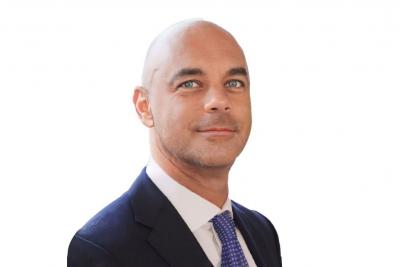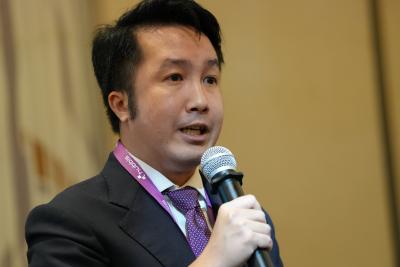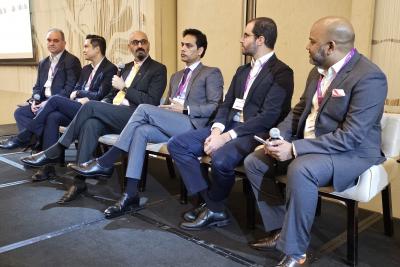Vietnam: Why Wealth Managers Must Keep a Close Eye on Global Regulations
Is Vietnam yet a signatory to the many new global regulations to have emerged in recent years? No, but there will no doubt be ever greater pressure from leading global jurisdictions and bodies to bring the country into line. Irene Lee, Business Development Director, Intermediary and Partnership at wealth management advisory and corporate services firm Hawksford, told delegates at the Hubbis Vietnam Wealth Management Forum they must be aware of the need for compliance.
“You might ask what all the new global regulations, such as the Common Reporting Standard (CRS) and the Automatic Exchange of Information (AEOI), have to do with Vietnam,” she began. “Well, the answer is that although Vietnam might not yet be listed as a signatory to CRS and AEOI and other regulations, we think it is just a matter of time before the country accedes to those demands. We therefore need, as professionals, to give our clients the full information to make informed decisions in anticipation of the ever changing environment. We must pay ever closer attention to the new world of regulation and compliance.”
Lee also observed that the creation of regulatory and tax compliant tools for wealth management and estate planning can best be achieved with professional advice and services from reputable jurisdictions. The continuous and projected evolution of both Singapore and Hong Kong as private client wealth management centres in Asia is also closely linked to regulatory demands, both globally and locally, and those markets can serve as adjuncts for the evolutionary Vietnamese wealth management market.
Lee explained that Asia’s growth path is virtually set in stone. She noted that the IMF earlier this year highlighted its projection that Asia will contribute two-thirds of global growth in 2018 as a whole. However, Lee also acknowledged that there are always uncertainties ahead. “What is certain is that change is coming,” she advised the audience. “Asia’s HNWIs and their advisers must adapt their strategies and plan ahead. For those who do not, failure beckons."
Lee noted how the huge economic growth in the region is propelling Asia’s wealth management industry. Looking at the world’s total offshore wealth, the numbers look very encouraging, especially for Singapore and Hong Kong. “The world’s total offshore wealth stands at USD10.3 trillion,” Lee noted, “with Switzerland at the top with USD2.2 trillion, but with Singapore already at USD0.9 trillion and Hong Kong at USD1.1 trillion. Due to Asia’s remarkable growth, both are set to grow at more than twice the pace of Switzerland in the next several years.”
Why Asia’s HNWIs must (eventually) march in line
Lee noted that Singapore and Hong Kong are both keeping closely in step with global regulatory developments and both are signatories of the Organization for Economic Cooperation and Development Multilateral Competent Authority Agreement (MCAA), a multilateral framework agreement that provides a standardised mechanism to facilitate the automatic exchange of information for tax matters and avoids the need for bilateral agreements to be concluded.
She then focused on a central piece of global regulation, namely the Common Reporting Standard. "CRS guidance is formally in place to prevent tax evasion, combat money laundering and improve tax transparency," Lee commented, "but many also feel they are being watched by ‘Big Brother', and in some sense, this is quite accurate."
Lee highlighted that CRS, AEOI and MCAA reinforce the trend towards tax compliance. “Most clients do not want to evade tax, they do not mind to some extent being scrutinised, but, they are concerned about their safety and security,” she said. “Private clients should note that the confidentiality of taxpayer information is a fundamental cornerstone in all exchanges, using internationally required confidentiality and data-protection safeguards.”
Lee highlighted that according to the OECD, as of April 2018, there are now over 2700 bilateral exchange relationships activated for 80 jurisdictions committed to the CRS. Jurisdictions may alternatively rely on a bilateral agreement, such as a double tax treaty or a tax information exchange agreement.
The net widens
“What does this all mean?” asked Lee rhetorically. “All these countries have signed up and agreed to exchange information.” Although Vietnam is not yet involved as a signatory to these regulations, there will be mounting pressure from the leading global economies and multi-lateral bodies for the country to eventually fall into line.
Singapore edges ahead
As this likelihood edges closer, it is worth considering how to work with the high-quality offshore wealth management centres in the region. Singapore has certainly focused on boosting its appeal in many different areas and Singapore’s demonstrates excellence on so many levels, Lee observed. It has been achieved through outstanding infrastructure, smart government policies, a competitive and skilled labour force, and the culture of innovation. Singapore, Lee noted, is pro-business with a stable government and over 70 tax and trade benefits.
“These factors and many more have helped create the deep and diverse expertise in the financial and wealth management services here today,” Lee observed. “It is also seen as a tax compliant, safe haven by Asia’s HNWIs.”
Lee then briefly reviewed Singapore and Hong Kong as wealth management centres. The similarities are many, Lee explained. Both are reputed financial centres with sound economic and monetary governance, strong, stable financial markets and both have strong legal frameworks based in English Common Law. Their infrastructure is excellent, both have zero capital gains, and both have zero withholding tax on dividend distribution.
Some of the Singapore tax is based on remittance, while Hong Kong is purely territorial, Lee noted. Singapore has a 10% levy on gross royalties and 15% gross interest paid to non-residents with no business operations in Singapore while Hong Kong has no gross interest but may charge 16.5% tax on either 30% or 100% of gross royalties depending on conditions.
Hong Kong may be far ahead in terms of its capital markets expertise and a far larger listed equity market worth more than USD4 trillion, its pure ‘territorial tax’ system may seem attractive where tax is levied only on Hong Kong sourced taxable profit from a business carried out in Hong Kong, and offshore profits are tax exempt. However, Hong Kong’s main negatives include possible political unrest, fewer business incentives, fewer tax and trade treaties, and the knowledge that it will revert to China within 30 years.
Singapore's equity market is only worth about USD800 billion, and its main disadvantages, on the other hand, include a tax levied on foreign sourced income if remitted to Singapore; unless it is foreign sourced dividends, foreign branch profits or foreign sourced service income subject to stipulated conditions. And there is withholding tax on some income classes on non-residents or non-resident companies, as well as 7% GST.
Lee then highlighted the key requirements for company incorporation and ongoing filing and compliance needs in both jurisdictions.
Singapore – your favoured offshore venue
But looking at all these pluses and minuses, Singapore has in some respects now overtaken Hong Kong,” Lee concluded. “Singapore is still top of the World Bank’s ‘Ease of Doing Business Index’ and is clearly the preferred company incorporation and investment destination in Asia. With no estate duty or capital gains tax and one of the lowest corporate tax rates in the world, with rapid incorporation, and a wide array of entity structure options, as well as welcoming foreign company rules, Singapore cannot be overlooked as one of the first choices in the region. And this is aside from all the other logistical, technological and infrastructure advantages.”
Whichever wealth management centre Asia’s HNWIs are drawn to, regulation will affect them, especially as local and global regulation rises, and as compliance requirements intensify.
Hawksford’s South Asia headquarters is in Singapore. Although the global HQ is in Jersey, Singapore became Hawksford’s focal centre for South Asia when in 2014 the firm made its first major acquisition, buying the Singapore-based corporate services business in Asia named Janus Corporate Solutions, which also has an office in Hong Kong. Then in 2017, Hawksford was granted a trust licence by the Monetary Authority of Singapore.
The company made a further major leap forward in the region earlier this year when it acquired People & Projects Ltd (P&P), as part of the firm's strategic expansion in Asia, transforming Hawksford with the addition of a dynamic, full-service corporate services business with a strong track record of supporting international corporates. The deal beefed up the firm’s presence in Singapore and Hong Kong, as well as adding several offices in mainland China. Some fifty per cent of Hawksford’s global employees are now based in Asia.
Lee and her colleagues at Hawksford are working to build their HNWI relationships through broadly-based connections across Asia with lawyers, accountants, private bankers, IFAs, external asset managers and other non-competing advisers and intermediaries in the region.
Lee concluded her talk by reminding the audience that there are three certainties in life: death, taxes and change. “If you fail to change, you will fail, so offer your clients advice to make certain they are tax-compliant and not evading tax knowingly or unknowingly, and ensure they have all the information they need to make informed decisions.”

More from Irene Lee, Hawksford
Strategy & Practice Management
Wealth management in Asia: Rapid growth amidst regulatory proliferation management - Philippines
Strategy & Practice Management
Wealth management in Asia: Rapid growth amidst regulatory proliferation - Thailand
Strategy & Practice Management
Wealth management in Asia: Rapid growth amidst regulatory proliferation management - Singapore
Latest Articles







